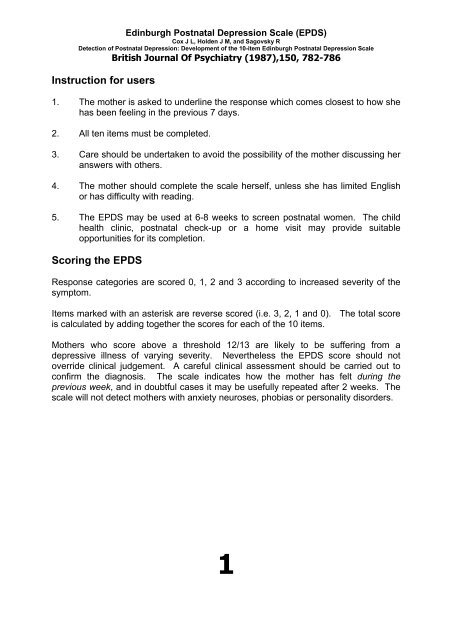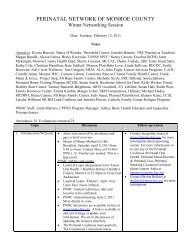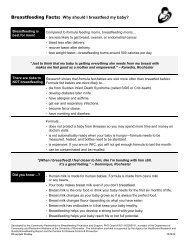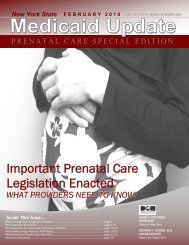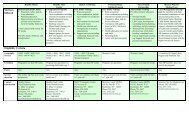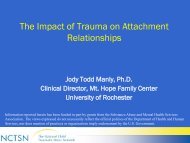Edinburgh Postnatal Depression Scale
Edinburgh Postnatal Depression Scale
Edinburgh Postnatal Depression Scale
Create successful ePaper yourself
Turn your PDF publications into a flip-book with our unique Google optimized e-Paper software.
<strong>Edinburgh</strong> <strong>Postnatal</strong> <strong>Depression</strong> <strong>Scale</strong> (EPDS)<br />
Cox J L, Holden J M, and Sagovsky R<br />
Detection of <strong>Postnatal</strong> <strong>Depression</strong>: Development of the 10-item <strong>Edinburgh</strong> <strong>Postnatal</strong> <strong>Depression</strong> <strong>Scale</strong><br />
British Journal Of Psychiatry (1987),150, 782-786<br />
Instruction for users<br />
1. The mother is asked to underline the response which comes closest to how she<br />
has been feeling in the previous 7 days.<br />
2. All ten items must be completed.<br />
3. Care should be undertaken to avoid the possibility of the mother discussing her<br />
answers with others.<br />
4. The mother should complete the scale herself, unless she has limited English<br />
or has difficulty with reading.<br />
5. The EPDS may be used at 6-8 weeks to screen postnatal women. The child<br />
health clinic, postnatal check-up or a home visit may provide suitable<br />
opportunities for its completion.<br />
Scoring the EPDS<br />
Response categories are scored 0, 1, 2 and 3 according to increased severity of the<br />
symptom.<br />
Items marked with an asterisk are reverse scored (i.e. 3, 2, 1 and 0). The total score<br />
is calculated by adding together the scores for each of the 10 items.<br />
Mothers who score above a threshold 12/13 are likely to be suffering from a<br />
depressive illness of varying severity. Nevertheless the EPDS score should not<br />
override clinical judgement. A careful clinical assessment should be carried out to<br />
confirm the diagnosis. The scale indicates how the mother has felt during the<br />
previous week, and in doubtful cases it may be usefully repeated after 2 weeks. The<br />
scale will not detect mothers with anxiety neuroses, phobias or personality disorders.<br />
1
<strong>Edinburgh</strong> <strong>Postnatal</strong> <strong>Depression</strong> <strong>Scale</strong> (EPDS)<br />
Cox J L, Holden J M, and Sagovsky R<br />
Detection of <strong>Postnatal</strong> <strong>Depression</strong>: Development of the 10-item <strong>Edinburgh</strong> <strong>Postnatal</strong> <strong>Depression</strong> <strong>Scale</strong><br />
British Journal Of Psychiatry (1987),150, 782-786<br />
Name:<br />
Address:<br />
Baby’s age:<br />
As you have recently had a baby, we would like to know how you are feeling.<br />
Please UNDERLINE the answer which comes closest to how you have felt IN<br />
THE PAST 7 DAYS, not just how you feel today. Here is an example, already<br />
completed.<br />
I have felt happy:<br />
Yes, all the time<br />
Yes, most of the time<br />
No, not very often<br />
No, not at all<br />
This would mean: “I have felt happy most of the time” during the past week.<br />
Please complete the other questions in the same way.<br />
In the past 7 days:<br />
1. I have been able to laugh and see the funny side of things<br />
As much as I always could<br />
Not quite so much now<br />
Definitely not so much now<br />
Not at all<br />
2. I have looked forward with enjoyment to things<br />
As much as I ever did<br />
Rather less than I used to<br />
Definitely less than I used to<br />
Hardly at all<br />
3.* I have blamed myself unnecessarily when things went wrong<br />
Yes, most of the time<br />
Yes, some of the time<br />
Not very often<br />
No, never<br />
4. I have been anxious or worried for no good reason<br />
No, not at all<br />
Hardly ever<br />
Yes, sometimes<br />
Yes, very often<br />
2
<strong>Edinburgh</strong> <strong>Postnatal</strong> <strong>Depression</strong> <strong>Scale</strong> (EPDS)<br />
Cox J L, Holden J M, and Sagovsky R<br />
Detection of <strong>Postnatal</strong> <strong>Depression</strong>: Development of the 10-item <strong>Edinburgh</strong> <strong>Postnatal</strong> <strong>Depression</strong> <strong>Scale</strong><br />
British Journal Of Psychiatry (1987),150, 782-786<br />
5.* I have felt scared or panicky for no very good reason<br />
Yes, quite a lot<br />
Yes, sometimes<br />
No, not much<br />
No, not at all<br />
3
<strong>Edinburgh</strong> <strong>Postnatal</strong> <strong>Depression</strong> <strong>Scale</strong> (EPDS)<br />
Cox J L, Holden J M, and Sagovsky R<br />
Detection of <strong>Postnatal</strong> <strong>Depression</strong>: Development of the 10-item <strong>Edinburgh</strong> <strong>Postnatal</strong> <strong>Depression</strong> <strong>Scale</strong><br />
British Journal Of Psychiatry (1987),150, 782-786<br />
6.* Things have been getting on top of me<br />
Yes, most of the time I haven’t been able to cope at all<br />
Yes, sometimes I haven’t been coping as well as usual<br />
No, most of the time I have coped quite well<br />
No, I have been coping as well as ever<br />
7.* I have been so unhappy that I have had difficulty sleeping<br />
Yes, most of the time<br />
Yes, sometimes<br />
Not very often<br />
No, not at all<br />
8.* I have felt sad or miserable<br />
Yes, most of the time<br />
Yes, quite often<br />
Not very often<br />
No, not at all<br />
9.* I have been so unhappy that I have been crying<br />
Yes, most of the time<br />
Yes, quite often<br />
Only occasionally<br />
No, never<br />
10.* The thought of harming myself had occurred to me<br />
Yes, quite often<br />
Sometimes<br />
Hardly ever<br />
Never<br />
4
<strong>Edinburgh</strong> <strong>Postnatal</strong> <strong>Depression</strong> <strong>Scale</strong> (EPDS)<br />
Cox J L, Holden J M, and Sagovsky R<br />
Detection of <strong>Postnatal</strong> <strong>Depression</strong>: Development of the 10-item <strong>Edinburgh</strong> <strong>Postnatal</strong> <strong>Depression</strong> <strong>Scale</strong><br />
British Journal Of Psychiatry (1987),150, 782-786<br />
5


